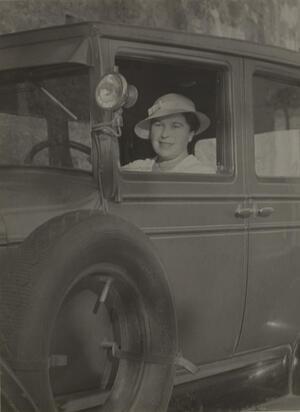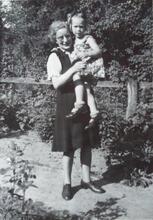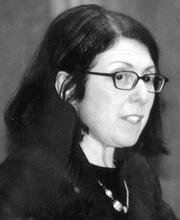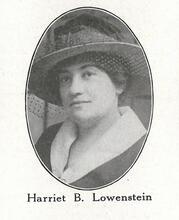Marguerite Wolff
Marguerite Wolff, born in London, and her husband Martin were members of Berlin’s intelligentsia. In 1924 Viktor Bruns established the Kaiser Wilhelm Institute for Foreign Public Law and International Law, where Wolff worked from 1925 to 1933, first in a leading managerial role, helping Bruns expand the Institute, later as a research scholar focusing on British and American notions of public international law. She made significant contributions to the Institute’s research output and journal, as well as providing expert English-German legal translations. Wolff returned to England in 1935, preceded by her younger son and followed by her husband in 1938. Although she was unable to continue her scholarly work in England, she contributed further to the world of learning as exceptionally gifted translator and language editor.
Marguerite Wolff was an exception among women scholars in Germany in the first three decades of the twentieth century. With a Masters degree in English from Cambridge University but no formal legal training, she was a driving force in setting up a legal research institute in Berlin and made significant contributions to legal scholarship and legal translation.
Family and Education
Marguerite Jolowicz was born in London on December 10, 1883, as a dual British-German citizen, the latter through her father Hermann Jolowicz (1849-1934), a wealthy silk merchant who was born in what was then Prussian Pleschen (Pleszew) and learned the trade in Lyon, France. Her mother was Marie Litthauer, born 1864 in what was then also Prussian Neutomysl (Nowy Tomyśl). Marguerite had two brothers, Paul (born 1885) and Herbert Felix (born 1890), who would later become Regius Professor of Civil Law at the University of Oxford.
Unusually for women at the time, but in line with her liberal bourgeois upbringing, Marguerite Jolowicz obtained a Master of Arts in English from Newnham College, Cambridge University, apparently with a “first.” In 1906 she married the legal scholar Martin Wolff (1872–1953), an expert in commercial, comparative, and private international law. The couple moved to Berlin, then to Marburg (1914), Bonn (1918), and back to Berlin (1921). They had two sons—Konrad (1907-1989), who later became a famous pianist, and Victor (1911-1944), who qualified as a barrister and served in the Royal Air Force. In Berlin the couple belonged to the city’s intelligentsia.
At the Kaiser Wilhelm Institute
In 1924, Viktor Bruns (1884–1943), a friend of the family and colleague of Martin’s, established the Kaiser Wilhelm Institute for Foreign Public Law and International Law. Their plan was for Marguerite to be the Institute’s “housewife” (in the words of Viktor’s wife Eva), by which they meant that she would manage the practical aspects of growing a small advance team into a fully functioning Institute with its own library. Initially appointed formally as “academic assistant,” she soon became a Referentin (senior research scholar) in the area of public international law developments in the anglophone world, in particular the United Kingdom and United States. As Referentin, she was deservedly treated on par with fully legally trained male colleagues, including influential scholars such as Hermann Heller and Gerhard Leibholz. In a glowing reference, Bruns later praised her academic work, her outstanding contribution to the editing of the Institute’s journal, and her exceptional gift as a legal translator and editor who would also give English legal terminology courses for other members of the Institute.
In Berlin, Wolff published two books. The first, a book on laws of the press in the United Kingdom published by the Institute in 1928, was a masterly exercise in comparative law, explaining peculiarities of English law to an audience of lawyers trained in the German legal system; readers had no indication that the author had no formal legal training in English or German law. The second, in 1933, was a textbook for car and truck drivers; it was republished in 1934 but with an "Aryan" author.
Fleeing Nazi Germany
In April 1933, with the accession to power of the Nazi party, Marguerite Wolff was dismissed effective May 1, in fact earlier than possible under the Law for the Restoration of the Professional Civil Service (April 7, 1933) and the Second Implementing Regulation (May 4, 1933). One explanation is that this was a consensual arrangement with Viktor Bruns, in correct anticipation of further persecution and any lack of medium-term perspective. Initially staying in Berlin, she contributed to the world of learning by helping to make the work of Martin Wolff’s faculty colleague and fellow émigré to England scholar Fritz Schulz known to the anglophone world. She translated his Principles of Roman Law (published 1936) to considerable acclaim. As one reviewer noted: “The translator is to be congratulated on her success in a difficult task. Refractory Law-German has been reduced to clear, readable English” (Duff, 1937).
In 1935, Marguerite returned to Great Britain, where her son Victor had been living since 1933. Konrad emigrated in October 1933, first to France and then, in 1941, to the United States. In 1937, he married the photographer Ilse Bing. Martin Wolff, whose lectures had been obstructed by Nazi students in 1933, was forcibly retired by the Berlin University in 1935 and as adviser to the sister Kaiser Wilhelm Institute on Foreign Private and Private International Law in 1937. He eventually emigrated to Great Britain in September 1938 to take up a fellowship at All Soul’s College, Oxford, with the family home being in London.
Later Career
In Oxford, Martin Wolff wrote his seminal textbook on Private International Law (published in 1945, 1950). The great success of this book was to no small amount due to the superb linguistic editing by Marguerite Wolff. As a reviewer noted: “The excellence of the English is due principally to Mrs. Wolff, whose skill in rendering the author’s thoughts into precise, technical but eminently readable language is a triumphant success” (Morris, 1946).
During World War II, Marguerite Wolff also worked as news editor for the BBC. She worked subsequently as translator at the Nuremberg Trials, supervising the translations of the trial proceedings. Later she also translated lectures given by German scientists in the United Kingdom, including a lecture given in London in 1956 by Otto Hahn (1878–1968), then president of the Max Planck Society, the successor to the Kaiser Wilhelm Society. She also co-translated F.A. Mann’s authoritative work The Legal Aspect of Money into German (Das Recht des Geldes, 1960).
Marguerite Wolff died in London (Hampstead) on May 21, 1964.
Archive Berlin University (Archiv HUB): UK W 266 (PA Martin Wolff), esp. vol.1, p. 2a.
Archive MPA (Archiv zur Geschichte der Kaiser-Wilhelm-/Max-Planck-Gesellschaft, Berlin): III, 14, Nr.4783 (letters between M. Wolff and O. Hahn in 1956); II, 1A, Personalia Martin Wolff (with the so-called Wiedergutmachung [compensation] of Marguerite Wolff, 1951–1957, with the testimony of Victor Bruns, 19.12.1933).
Duff, P.W., Review of Fritz Schulz, Principles of Roman Law, transl. by Marguerite Wolff, 51 The Classical Review (1937), 238 f
Hansen, Thomas. Martin Wolff (1872-1953). Tübingen: Mohr Siebeck, 2009.
Harnack, Adolf von, eds. Handbuch der Kaiser Wilhelm Gesellschaft, Hrsg. A. v. Harnack, 215. Berlin: Reimar Hobbing, 1928.
Morris, John, Review of Martin Wolff, Private International Law (1945), 62 Law Quarterly Review (1946), 88 ff.
Röder, Werner and Herbert A. Strauss, eds. Biographisches Handbuch der deutschsprachigen Emigration nach 1933, vol. 2, 1261-1263. München: De Gruyter, 1980–1983.
Röwekamp, Marion. Juristinnen – Lexikon zu Leben und Werk. Baden-Baden: Nomos 2005.
von Lösch, Gräfin Anna-Maria. Der nackte Geist. Die Juristische Fakultät der Berliner Universität im Umbruch von 1933, 360–366. Tübingen: Mohr Siebeck, 1999.
Vogt, Annette. Women Scientists in Kaiser Wilhelm Institutes, from A to Z (Dictionary), 163–164. Berlin: 1999. - 2nd rev. edition Berlin: 2008, pp. 214-216.
Wolff, Marguerite. Das Preßrecht Großbritanniens. Berlin: Verlag Georg Stilke, 1928.
Wolff, Marguerite. Das Neue Auto-Lehrbuch. Berlin: Verlag Das Auto und Kraftrad, 1933 (published in 1934 under the name of the engineer Helmut Schmidt; thanks to Christian Walther, 2021).






